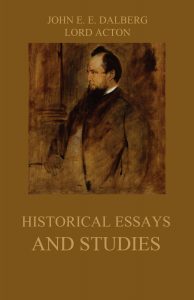Historical Essays and Studies – John Emerich Edward Dalberg
This volume must be regarded not as the support of an existing reputation, or as a bid for the establishment of posthumous renown, but as the record and memorial of a rare and attractive personality. The accurate, insatiable, and broad-minded student is revealed ; the generous champion of a noble cause which has suffered temporary defeat is seen on the field of his eager endeavour in controversy with Popes and Cardinals for the sake of freedom and truth ; and the principles which he brought to the study of history or elicited from his observation of men and affairs throughout the centuries are set forth for all to read.
From the Contents:
Wolsey And The Divorce Of Henry VIII.
The Borgias And Their Latest Historian
Secret History Of Charles II.
The Civil War In America. Its Place In History
The Rise And Fall Of The Mexican Empire
The Causes Of The Franco-Prussian War
… and many more …
Format: Paperback.
Historical Essays and Studies.
ISBN: 9783849694135
Available at amazon.com and other venues.
John Dalberg-Acton, 1st Baron of Acton and Politics (from Wikipedia):
In 1859, Acton settled in England, at his country house, Aldenham, in Shropshire. He returned to the House of Commons that same year as member for the Irish Borough of Carlow and became a devoted admirer and adherent of Prime Minister William Ewart Gladstone. However, Acton was not an active MP, and his parliamentary career came to an end after the general election of 1865, when he headed the Liberal ballot for Bridgnorth near his Shropshire home. Acton defeated Conservative leader Henry Whitmore, who successfully petitioned for a scrutiny of the ballots, and thus retained his own seat and Acton lost his new seat. After the Reform Act 1867, Acton again contested Bridgnorth, this time reduced to a single seat, in 1868 but to no avail.
Acton took a great interest in the United States, considering its federal structure the perfect guarantor of individual liberties. During the American Civil War, his sympathies lay entirely with the Confederacy, for their defence of States’ Rights against a centralised government that he believed would, by what he thought to be all historical precedent, inevitably turn tyrannical. His notes to Gladstone on the subject helped sway many in the British government to sympathise with the South. After the South’s surrender, he wrote to Robert E. Lee that “I mourn for the stake which was lost at Richmond more deeply than I rejoice over that which was saved at Waterloo,” adding that he “deemed that you were fighting battles for our liberty, our progress, and our civilization.”
In 1869 Queen Victoria raised Acton to the peerage as Baron Acton, of Aldenham in the County of Shropshire. His elevation came primarily through the intercession of Gladstone. The two were intimate friends and frequent correspondents. Matthew Arnold said that “Gladstone influences all round him but Acton; it is Acton who influences Gladstone.” Acton was appointed to the Royal Victorian Order as a Knight Commander (KCVO) in the 1897 Birthday Honours.
(The text of the last section was taken from a Wikipedia entry and is available under the the Creative Commons Attribution-ShareAlike License.)
Publisher’s Note: This book is printed and distributed by Createspace a DBA of On-Demand Publishing LLC and is typically not available anywhere else than in stores owned and operated by Amazon or Createspace.

